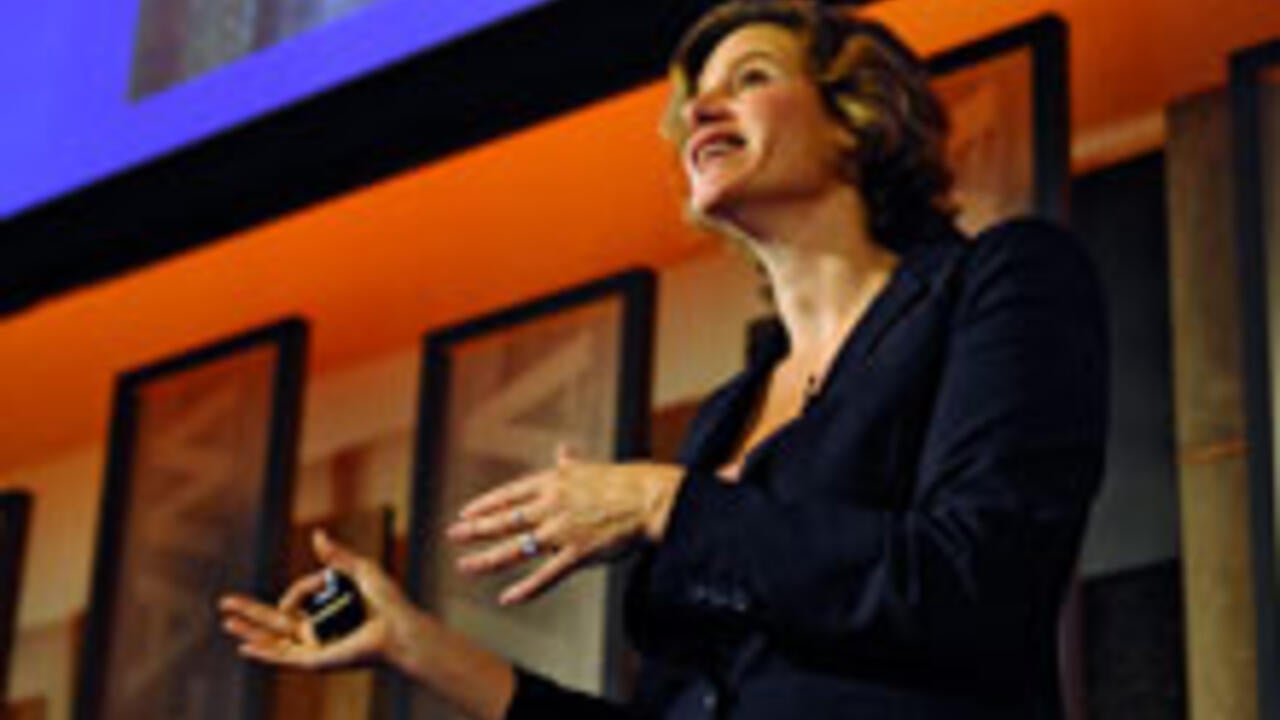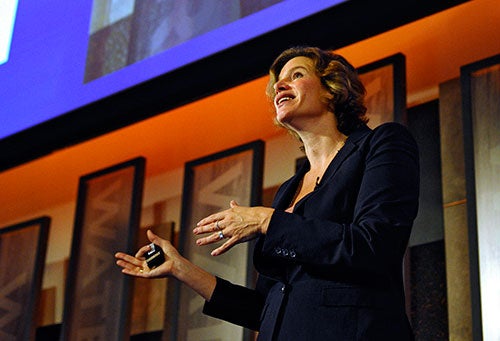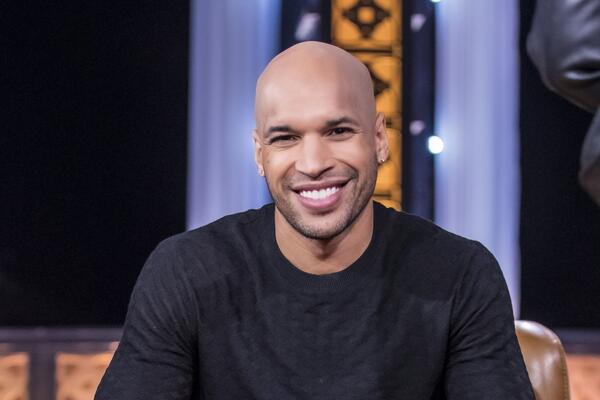
Innovation leaders offer a glimpse of the future
Connected communities, flexible organizations, trend spotters and risk takers in the spotlight at Waterloo Innovation Summit

Connected communities, flexible organizations, trend spotters and risk takers in the spotlight at Waterloo Innovation Summit
By Bill Bean Marketing and Strategic Communications
Mariana Mazzucato delivers the first keynote presentation at the Waterloo Innovation Summit.
A series of high-profile speakers shed light on the key ingredients in building successful innovation-based economies during 50 hours of high-intensity talks and tours at the annual Waterloo Innovation Summit on Thursday.
Summit chair David Fransen welcomed an audience of 250 global innovation leaders, academics and entrepreneurs to the event, hosted this year in partnership by the University of Waterloo and Communitech.
Ontario Premier Kathleen Wynne led a constellation of star keynote speakers and panellists, focusing on provincial support for the innovation super-cluster between Toronto and Waterloo Region.
She promised more attention to a high-speed rail link for the “fast-emerging tech scene” and said, “it is not a question of if the innovation super cluster will be linked with all day transit — it is only a question of how and how soon.”
Like business, governments can take steps that fail, the Premier said. And like business, governments don’t give up on the first failure. “We need innovation to compete and grow. So it follows that we need failure, too, and we need to remind people of that.”
It was a theme picked up by Mariana Mazzucato, the University of Sussex professor whose controversial 2013 book, The Entrepreneurial State: Debunking Public Vs. Private Sector Myths, stirred the waters of the international economic community.
Mazzucato told the room about the long-term role governments play in innovation. As an example, she showed how every technology behind the iPhone was government-funded: the internet, GPS, touch-screen displays and even the voice-activated “Siri.” She gave credit to the “dynamic people (who) put those technologies together in cool ways and found a market for them,” but urged a new attitude toward the governments that get so little credit for the environment in which innovative projects flourish.
BlackBerry CEO John Chen brought good news about the innovative startup that made Waterloo famous. BlackBerry handsets are part of the end-to-end security package that BlackBerry offers, Chen told the audience, and although it has lost traction to competitors, handsets remains part of the business.
Chen reminded the audience that BlackBerry holds 44,000 patents, most dealing with security, and that in a world increasingly concerned with security and privacy, BlackBerry is still a valuable brand.
University leaders celebrated the role of universities in the enterprise sector, with Suzanne Fortier, principal and vice-chancellor of McGill University, saying that the investment in innovation satisfies the three basic missions of universities: “teaching/learning, research and service to the community.”
Feridun Hamdullahpur, president of the University of Waterloo agreed: “The issue is not to rush these grads into the market underprepared. How do we give them best quality education in the world, but ensure that they are also career-ready?”
Appetite for risk was a matter of debate in an afternoon panel about Making Big Bets on Science.
Philip Low, founder, Chair and CEO of NeuroVigil Inc., urged academics, researchers, investors employees and others to take time to listen as well as innovate: “Scientists like to talk about their own work; as entrepreneurs, we have to learn to listen.”
David Cory, deputy director, research for the Institute of Quantum Computing at the University of Waterloo, extolled the virtues of the Waterloo innovation ecosystem: “This is a wonderful place to build. . . It’s been a very energizing place to be.”
Keynote speaker Salim Ismail — angel investor, tech strategist and global ambassador for Singularity University — ended the day with a high-energy glimpse of the future.
With a rapid succession of slides, Ismail offered a dizzying vision of a disruptive future that is occurring right now. From mood-observing software to an open-source meal replacement beverage, Ismail revealed a disruptive present, where no company can afford to be a big company.
How society responds to that sensor-driven future is “Part of why I’m excited about what’s happening here in Waterloo,” he told the audience.
The venue shifted Friday to Communitech in Kitchener, where the 250 attendees heard from Silicon Valley veteran Steve Blank, on one of his rare trips out of the American startup heartland, among many other entrepreneurs, innovators and academics.
One of the biggest fans of the Waterloo innovation ecosystem, and one of the biggest names in serial entrepreneurship, Steve Blank echoed others in his praise of “this mythical place” that produced world-class graduates and world-class products.
“Waterloo was always this mythical place with these wonderful things coming out of it…. It was one miracle after another…”
But he challenged the entrepreneurial community and the wider community, to consider what their expectations were for the region.
“Do we want to be a farm team for Silicon Valley, that they start here” and then move to the Valley? “Do you believe this is a jobs program for people who live here, or are you trying to attract people to come here? . . . That’s a meta-discussion that needs to be had.”
Follow the Waterloo Innovation Summit blog for highlights and updates

Read more
Alum and founder Marc Lafleur shares how his entrepreneurship playbook has changed since selling his first company

Read more
How Doug Kavanagh’s software engineering degree laid the foundation for a thriving career in patient care

Read more
Upside Robotics secures new funding to accelerate the future of sustainable farming
The University of Waterloo acknowledges that much of our work takes place on the traditional territory of the Neutral, Anishinaabeg, and Haudenosaunee peoples. Our main campus is situated on the Haldimand Tract, the land granted to the Six Nations that includes six miles on each side of the Grand River. Our active work toward reconciliation takes place across our campuses through research, learning, teaching, and community building, and is co-ordinated within the Office of Indigenous Relations.